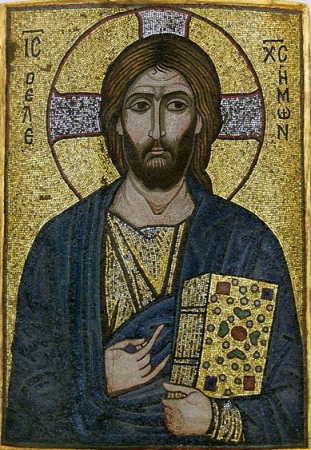“Jesus then asked him, ‘What is your name?’ He said, ‘Legion;’ for many demons had entered him.” (From Luke 8:26-39, Proper 7C)
He called himself Legion but that is not his true name. That is not who he is. It is, rather, what has become of him, what has happened to him. Let’s not get stuck on the demons. That’s simply descriptive of the emotional and spiritual disruption and “dis-integration” of our lives, a reality all of us have experienced. That he knows himself to be Legion means the causes, sources, and manifestations of this disruption and disintegration are many and great. I know there are times when I and my life could rightly be called Legion. I suspect you could say the same thing.
At a historical level Legion refers to a Roman army unit of about 6000 soldiers. So when this man says that he is Legion he is saying, “I have been overrun. I am divided and separated. I am fragmented and fractured. I am disrupted. I am overwhelmed. My life is broken into 6000 pieces.” Sound familiar? Ever felt like that?

This man is lost to himself. He has no center. He no longer understands who he is. He is without an identity. He has been dispossessed of himself and his humanity. His life has been shattered into pieces. He is alien to himself and alienated from his life. All this leaves him vulnerable, naked, exposed, and unclothed. He no longer lives in a house in the city, but in the tombs. He is in essence dead to himself.
Who of us does not know what that is like? One day we look in the mirror and say, “Who are you? I don’t recognize you.” Other days we say, “I don’t know what’s come over me. I’m just not myself today.” Our head is filled with conflicting thoughts and voices. We chase each thought but get nowhere. We listen to each voice but know nothing. There are times when we lose our bearings in life and no longer know who we are or what our life is all about. We silently wonder if we are going crazy. It is a place and time of separation, loneliness, and isolation. We are exiled from ourselves and each other.
We know what this man’s life is like. Each of us could tell about a time when our life was shattered and left in thousands of pieces that we just could not put back together. Dreams and hopes. A marriage. The death of a loved one. Faith and beliefs. We know what it is like to lose our self, our life, our name and identity. We know what it is like to be Legion.
I don’t know what in your life has shattered. I don’t know the thousands of pieces with which you live. I don’t know the Legion of your life. You have those answers, but I can tell you this. Whatever it might be it is the place to which Christ comes. Jesus comes to the Legion of our lives. He did for the man in today’s gospel and he does for each one of us.
Jesus steps out onto the land of this foreign country, the land of Legion. He comes to us as the one with inner clarity, focus, knowing, and understanding. He is the presence of unity, wholeness, and integration. He is the image of who we are and who we can become. That’s why we continue to seek and follow Jesus as our teacher, guide, and savior. He is and has the life we want.
Jesus comes unafraid of death or the tombs in which this man lives. He is not distracted by the man’s craziness. He is not repulsed by the man’s nakedness or appearance. He is not limited by the chains and shackles that bind this man’s life. He is unchallenged by the guard. Legion holds no power over Jesus.
“When the man saw Jesus, he fell down before him and shouted at the top of his voice, ‘What have you to do with me, Jesus, Son of the Most High God?’” Within that question are recognition and nonrecognition, likeness and unlikeness, sameness and difference. The man knows Jesus is nothing like him and yet, something within the man knows he is like Jesus. Something within him can still recognize Jesus; the divine one, the one who saves, the one who is whole, complete, and holy.
We can only ever recognize that which we already know, that which at some level is already a part of us. Despite the presence of Legion, the true image of and within this man was never completely lost or destroyed. It may have been taken over, covered up, forgotten, denied, or ignored but it was never absent. It was this true image, a reflection of Jesus himself, that recognized Jesus. That is as true for us as it is the man in today’s gospel.
Jesus stands before us as the mirror, the image, the truth-teller of who we really are. He gives us back ourselves. He reveals the original beauty of our creation. He stands before us with a truth that challenges us at the places in which our lives have become fragmented and distorted, in the ways in which we are not true to ourselves, and in the times when our identity has been lost and shattered.
Jesus comes to the man seeing and knowing a truth about him that the man can neither see nor know for himself. How can he? He has been convinced that his name is Legion. Jesus knows otherwise. In the face of that truth the unclean spirit cannot remain. Legion can never be our final reality or ultimate identity. That will always be Jesus. That is the truth that commanded Legion to leave. That is the truth that puts life back together. That is the truth that clothed this man, returned him to himself, and seated him at Jesus’ feet.
Yes, we know what it is like to be Legion. We can tell that story. For every story about Legion, however, there is a counter story. It is the story of our how our life was put back together, how we were given back ourselves, how we were seated at the feet of Jesus. It’s the story Jesus wants told. We need to tell it. Others need to hear it.
“Return to your home, and declare how much God has done for you.”


Leave a comment